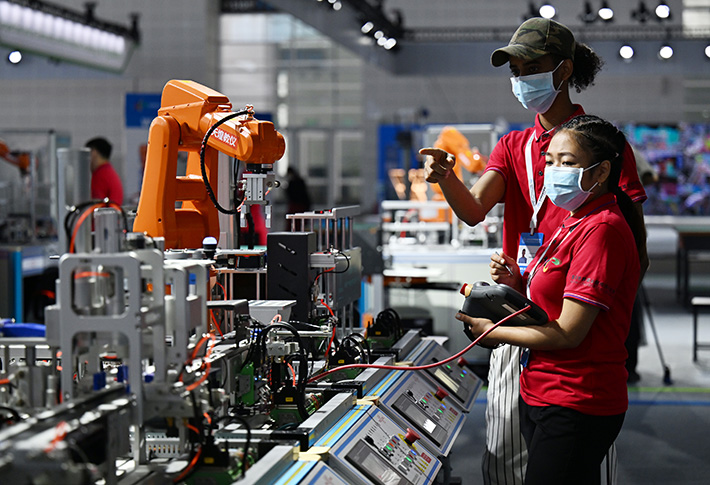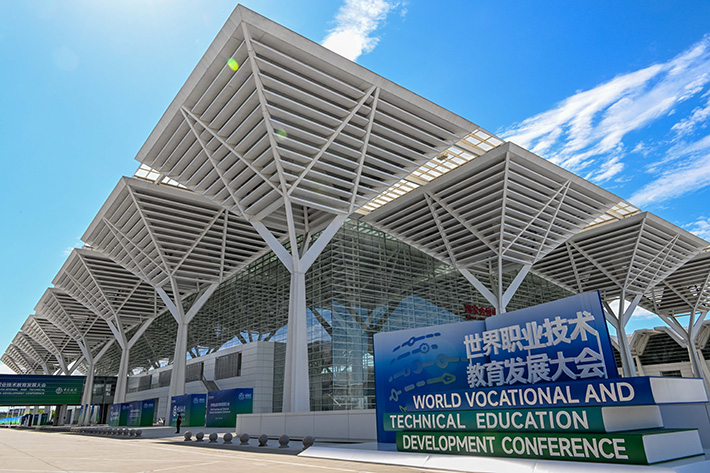|
||||||||||
| Home Nation World Business Opinion Lifestyle ChinAfrica Multimedia Columnists Documents Special Reports |
|
||||||||||
| Home Nation World Business Opinion Lifestyle ChinAfrica Multimedia Columnists Documents Special Reports |
| ChinAfrica |
| Training Talents of Tomorrow |
| Cooperation in vocational education among the BRICS countries is promising |
| By Sun Yi | VOL. 15 August 2023 ·2023-08-11 |

A Chinese participant works on his entry for the Belt and Road and BRICS Skills Development and Technology Innovation Competition in Shenyang, Liaoning Province, on 15 December 2020
When we think about our vision for education in 2050, several questions come to the mind: what practices should we keep? Which ones should we abandon? And which aspects require creative thinking for a redesign?
UNESCO provided some answers to these crucial questions in a report published in November 2021 titled “Reimagining our futures together: a new social contract for education.” Against this backdrop, it called for a radical transformation of education aimed at addressing the injustices of the past and strengthening our collective resolve to work towards a more sustainable and equitable future.
BRICS countries are economically interdependent and can mutually benefit from each other in human resource development. As an important cooperation mechanism to promote global governance, this grouping should strive to expand the pool of talents. In this regard, technical and vocational education and training (TVET) cooperation can be an effective tool.

A Russian (front) participant in the First Silk Road Craftsmen International Skills Competition in Beijing on 26 June 2019
World’s largest TVET system
China prioritises TVET to better adapt educational institutions to changes in industry. In doing so, the country first learned from developed countries such as Germany and the United Kingdom before embarking on a development path that suits its own conditions. Today, China has the most comprehensive vocational education system in the world, characterised by a variety of levels, categories and disciplines.
In 2021, China had 7,294 vocational high schools, 1,486 vocational colleges and 32 vocational universities. Last year, the sector surpassed the symbolic 800-billion-yuan ($110.8 billion) mark in the market, attracting more than 700 investments in a decade and raising 37.2 billion yuan ($5.2 billion) in funding. These figures highlight the growing need for skilled labour and the need to strengthen and reshape international cooperation in this field.
Vocational education differs from general education in that it focuses on training personnel with practical skills and specific expertise. In recent years, with the emergence of new industries and the international mobility of highly skilled workers, the TVET sector has undergone a digital, IT and smart transformation. The development of vocational education is no longer the responsibility of a single country. This means that in addition to teaching technical skills, teachers should emphasise the concept of a community of shared future for mankind.
Like global citizenship education, this should also be integrated into vocational education curricula to foster international understanding, tolerance, a global vision, and a sense of responsibility among learners.

The official launch of the BRICS Partnership on New Industrial Revolution Innovation Centre in Xiamen, Fujian Province, in December 2020
Alignment and harmonisation initiatives
In the context of the joint implementation of the Belt and Road Initiative, China is strengthening its engagement with its BRICS partners to develop vocational education for mutual benefit. Various alignment mechanisms have been established to harmonise the strategies of the five countries. In December 2017, China opened the first Luban Workshop within the grouping in India. Within a few years, this programme has promoted cooperation in production capacity among member countries while conveying the spirit of Chinese craftsmanship and sharing China’s knowledge with the international community, serving as a communication bridge among vocational education stakeholders.
In 2018, China and Russia jointly launched the Skills Passport System, which they promoted first among the BRICS countries. This is a skills assessment and certification system whose application helps to strengthen skills training and facilitates the harmonisation of vocational qualification standards among partner countries. Since 2020, the International Alliance of Skills Development for Belt & Road and BRICS Countries has been bringing together experts from various fields to perfect this system and develop the teaching materials required for adequate training.
In addition, the China & Africa (South Africa) Technical and Vocational Education Cooperation Alliance was established in Changzhou, Jiangsu Province, in 2018. At the same time, Changzhou College of Information Technology established its Bozhon Institute branch in South Africa. Between December 2021 and February 2022, two seminars were held in Tianjin and Shenzhen in Guangdong Province to promote China-India and China-Brazil cooperation in vocational education. These exchange mechanisms and platforms testify to the joint efforts of the BRICS countries in their education cooperation.

Participants at the First World Vocational College Skills Competition in Tianjin on 19 August 2022
Deeper and broader engagement
On 26 May 2022, at the conclusion of the Ninth Meeting of BRICS Ministers of Education held online, a declaration was adopted on the priorities and direction of future cooperation in education. The ministers agreed to maintain the spirit of openness, inclusiveness and mutually beneficial cooperation in the group, expand the space for cooperation in education, intensify educational exchanges, and promote educational collaboration among the five countries. This commitment prompted the establishment of the BRICS TVET Cooperation Alliance during the 14th BRICS Summit held via video conference on 23 June of the same year. The establishment of this alliance supports the economic transformation and industrial modernisation of the member countries.
Similarly, the First World Vocational and Technical Education Development Conference was held in Tianjin on 19 and 20 August of the same year. During the event, a forum and 14 sub-forums were organised on site and online on the theme of “Vocational and Technical Education Development in the Post-pandemic Era - New Changes, New Ways and New Skills.” Participants reflected on how vocational education and training can become a lever to address the problems of unbalanced and inadequate development and design a more efficient, equitable, sustainable and healthy development model. On the sidelines of the conference, China held the First World Vocational College Skills Competition.
Against this backdrop, the BRICS countries’ cooperation projects in vocational education have multiplied since 2022 and achieved very fruitful results. Thanks to the participation of governments, enterprises and partner institutions, cooperation has taken various forms: teacher training, school leaders’ forum, student camp, joint study, and vocational skills competition, among others. These exchanges and interaction activities have improved the soft skills of professional talents, such as communication, coordination, innovation, cultural identity, understanding, intercultural exchange, and teamwork.

Exterior view of the National Convention and Exhibition Centre (Tianjin), where the First World Vocational and Technical Education Development Conference was held on 19-20 August 2022
Innovation at the core of development
Innovation is a critical driver of economic and social progress. Faced with uncertainty in the global economy and politics, the BRICS countries today face a challenge, but also an opportunity. They must respond to this unprecedented situation with innovative initiatives.
The first thing to do is to take advantage of the complementarity among the different players. For example, by organising vocational skills competitions, companies can be encouraged to play a greater role in this area to better link education with the world of work. In addition, partner countries should look for common grounds while respecting their differences to ensure mutual trust and communication at different levels of their cooperation.
In addition, international TVET cooperation should include the harmonisation of professional standards and the development of new rules adapted to the current situation and national conditions. On the one hand, this will allow Chinese professionals to better adapt to global professional standards, facilitating their international mobility. On the other hand, this approach will accelerate the absorption of talent from partner countries in China and alleviate the shortage of personnel in certain fields.
Finally, this cooperation should not be limited to simple international exchanges, such as study visits. Focusing on building a long-term talent pool that values practice and adaptability is key to cultivating innovative, enterprising professionals with an international perspective.
With this in mind, the BRICS Partnership on New Industrial Revolution Innovation Centre was officially established in Xiamen, Fujian Province, in December 2020. In cooperation with Xiamen University and Huaqiao University, this centre has brought together the talents of the BRICS Universities League and BRICS Network University, strengthening the five countries’ partnership on the new industrial revolution. By focusing on the digital development of higher education, it aims to create a pool of professionals for the grouping.
Meeting the challenges
Since the mechanism was established 17 years ago, cooperation among BRICS countries has steadily intensified, covering a wide range of areas, including agriculture, science and technology, culture, health, education and think tanks. In 2017, the five countries reaffirmed their determination to pursue economic, political and cultural cooperation at the Ninth BRICS Summit in Xiamen. The leaders all supported the initiative to create a BRICS Plus model to enhance the value of the grouping. This ushered in the second decade of cooperation. In 2022, under the Chinese presidency, the creation of a high-quality partnership was put on the agenda, which is of great importance for the future cooperation of the five countries in vocational education.
However, it must be recognised that this cooperation still has shortcomings. Some Chinese companies operating overseas have communication problems with their local counterparts. Their staff, often lacking knowledge of local languages and customs, is sometimes limited to technical positions. To overcome this, it is necessary to establish a high-quality training mechanism, to align local vocational education with international rules, and to promote the involvement of companies. Moreover, with the development of new technologies, vocational education in the BRICS countries can use digital curricula and electronic teaching materials to enhance its digitalisation.
Promoting cooperation and exchanges in TVET among the BRICS countries will contribute not only to the long-term human resource development and the transformation of the “demographic dividend” into a “talent dividend,” but also to understanding and mutual appreciation of the five countries. Going forward, partner countries, taking into account their talent development needs, will join hands to address new challenges from a sustainable development perspective, thereby contributing to global economic recovery and improved world governance in the post-pandemic era.
| About Us | Contact Us | Advertise with Us | Subscribe |
| Copyright Beijing Review All rights reserved 京ICP备08005356号-5 京公网安备110102005860号 |